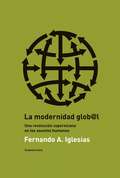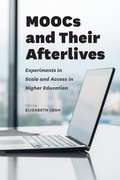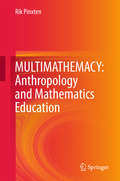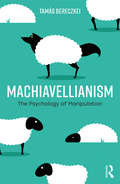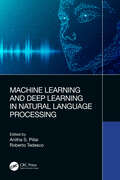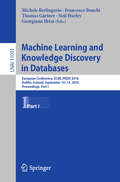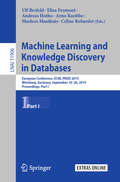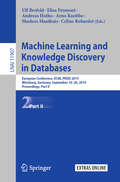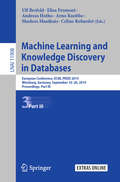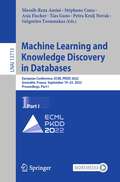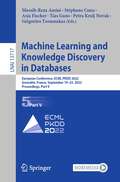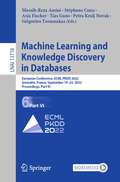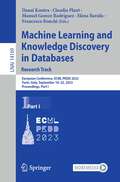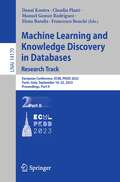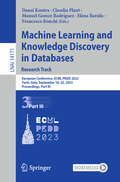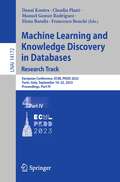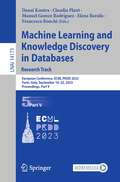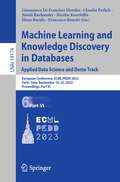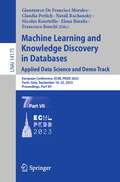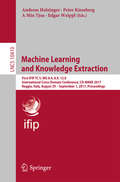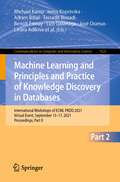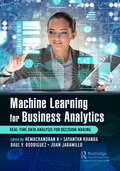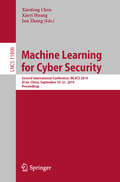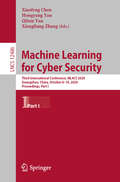- Table View
- List View
MODERNIDAD GLOBAL, LA (EBOOK)
by Fernando IglesiasEstamos, como muchos se han ocupado de señalar, ante un cambio de paradigmas. Asimilar la globalización a una revolución copernicana implica comprender que las naciones no han desaparecido ni van a desaparecer en lo inmediato, como se anunciaba hace una década. Lo que sí está desapareciendo es la era en la que las categorías nacionales ocupaban el centro del escenario social y las instituciones de cada país gozaban del monopolio de las acciones; todo lo cual obliga a un reemplazo de los viejos conceptos. Con este ambicioso libro Fernando Iglesias se propone, anclando su lúcido análisis en la experiencia argentina, por un lado, describir las complejas dinámicas de la globalización; y, por el otro, contribuir a la reconexión entre la emergente modernidad global y las tradiciones del universalismo ilustrado, cuya relación fue interrumpida por un siglo XX marcado por el apogeo de particularismos nacionalistas, clasistas, racistas y religiosos.
MOOCs and Their Afterlives: Experiments in Scale and Access in Higher Education
by Elizabeth LoshA trio of headlines in the Chronicle of Higher Education seem to say it all: in 2013, “A Bold Move Toward MOOCs Sends Shock Waves;” in 2014, “Doubts About MOOCs Continue to Rise,” and in 2015, “The MOOC Hype Fades.” At the beginning of the 2010s, MOOCs, or Massive Open Online Courses, seemed poised to completely revolutionize higher education. But now, just a few years into the revolution, educators’ enthusiasm seems to have cooled. As advocates and critics try to make sense of the rise and fall of these courses, both groups are united by one question: Where do we go from here? Elizabeth Losh has gathered experts from across disciplines—education, rhetoric, philosophy, literary studies, history, computer science, and journalism—to tease out lessons and chart a course into the future of open, online education. Instructors talk about what worked and what didn’t. Students share their experiences as participants. And scholars consider the ethics of this education. The collection goes beyond MOOCs to cover variants such as hybrid or blended courses, SPOCs (Small Personalized Online Courses), and DOCCs (Distributed Open Collaborative Course). Together, these essays provide a unique, even-handed look at the MOOC movement and will serve as a thoughtful guide to those shaping the next steps for open education.
MULTIMATHEMACY: Anthropology and Mathematics Education
by Rik PinxtenThis book defends that math education should systematically start out from the diverse out-of-school knowledge of children and develop trajectories from there to the Academic Mathematics tower of knowledge. Learning theories of the sociocultural school (Vygotsky and on) are used here, and ethnographic knowledge from around the world is shown to offer a rich and varied base for curricula. The book takes a political stand against the exclusively western focus in OECD analyses and proposals on math education. This book aimsat agents in education and social actions in every cultural environment. But itis also attractive to mathematicians, anthropologists and other specialists. Itoffers a broad and scholarly view of knowledge and culture and a veryoriginal transcultural and transdisciplinarian approach to education. Ubiratan D'Ambrosio, UNICAMP/Universidade Estadual de Campinas, Brazil
Macaria: or, Altars Of Sacrifice (Library of Southern Civilization)
by Drew Gilpin Faust Augusta Jane EvansFirst published in 1864, Macaria; or, Altars of Sacrifice was the third novel of Augusta Jane Evans, one of the leading women writers of nineteenth-century domestic fiction. A wartime best seller, with more than twenty thousand copies in circulation in the print-starved Confederacy before the war’s end, the novel was also extremely well received along the Union front, so much so that some northern officials thought it should be banned. Long out of print and largely unavailable until now, Macaria is a compelling narrative about women and war. <p><p> In Macaria, Evans charts the journey of two southern women toward ultimate self-realization through their service in the war-torn Confederacy. Discarding the theme of romantic fulfillment, Evans skillfully crafts a novel about women compelled by the departure and death of so many southern men to find meaning in their own “single blessedness,” rather than in marriage. <p><p> Drew Gilpin Faust, in her perceptive introduction to this edition, places the novel in the context of the concerns of Confederate nationalism and the contributions of women during the Civil War. She provides an ideological and historical framework within which to interpret the novel and introduce it to a new generation of readers. Largely overlooked in the current revival of women’s fiction, Augusta Jane Evans is less well known today than she should be. The reissue of this volume will do much to garner Evans a well-deserved place in the existing body of American literature, and especially southern and women’s literature.
Machiavellianism: The Psychology of Manipulation
by Tamás BereczkeiThe world abounds with tricksters, swindlers, and impostors. Many of them may well be described with the term Machiavellian. Such individuals disrespect moral principles, deceive their fellow beings, and take advantage of others’ frailty and gullibility. They have a penetrating, rational, and sober mind undisturbed by emotions. At times we cannot help but be enchanted by their talent even though we know they misuse it. <P><P> Recent studies have revealed that Machiavellians possess a complex set of abilities and motivations. This insightful book examines the complexities of the Machiavellian trait, in relation to attitude, behaviour, and personality. By integrating results and experiences from social, personality, cognitive, and evolutionary psychology, Tamás Bereczkei explores the characteristics of Machiavellianism (such as social intelligence, deception, manipulation, and lack of empathy), and the causes and motives guiding Machiavellian behaviour. The author also demonstrates how Machiavellianism is related to strategic thinking and flexible long-term decisions rather than to a short-term perspective, as previously thought, and explores Machiavellianism in relation to the construct of the Dark Triad. <P><P> The first comprehensive psychological book on Machiavellianism since Christie and Geis’ pioneering work in 1970, Machiavellianism summarises the most important research findings over the last few decades. This book is fascinating reading for students and researchers of psychology and related courses, as well as professionals dealing with Machiavellians in their work and practice.
Machine Learning and Deep Learning in Natural Language Processing
by Anitha S. Pillai Roberto TedescoNatural Language Processing (NLP) is a sub-field of Artificial Intelligence, linguistics, and computer science and is concerned with the generation, recognition, and understanding of human languages, both written and spoken. NLP systems examine the grammatical structure of sentences as well as the specific meanings of words, and then they utilize algorithms to extract meaning and produce results. Machine Learning and Deep Learning in Natural Language Processing aims at providing a review of current Neural Network techniques in the NLP field, in particular about Conversational Agents (chatbots), Text-to-Speech, management of non-literal content – like emotions, but also satirical expressions – and applications in the healthcare field. NLP has the potential to be a disruptive technology in various healthcare fields, but so far little attention has been devoted to that goal. This book aims at providing some examples of NLP techniques that can, for example, restore speech, detect Parkinson’s disease, or help psychotherapists. This book is intended for a wide audience. Beginners will find useful chapters providing a general introduction to NLP techniques, while experienced professionals will appreciate the chapters about advanced management of emotion, empathy, and non-literal content.
Machine Learning and Knowledge Discovery in Databases: European Conference, ECML PKDD 2018, Dublin, Ireland, September 10–14, 2018, Proceedings, Part I (Lecture Notes in Computer Science #11051)
by Michele Berlingerio Francesco Bonchi Thomas Gärtner Neil Hurley Georgiana IfrimThe three volume proceedings LNAI 11051 – 11053 constitutes the refereed proceedings of the European Conference on Machine Learning and Knowledge Discovery in Databases, ECML PKDD 2018, held in Dublin, Ireland, in September 2018. The total of 131 regular papers presented in part I and part II was carefully reviewed and selected from 535 submissions; there are 52 papers in the applied data science, nectar and demo track. The contributions were organized in topical sections named as follows: Part I: adversarial learning; anomaly and outlier detection; applications; classification; clustering and unsupervised learning; deep learningensemble methods; and evaluation. Part II: graphs; kernel methods; learning paradigms; matrix and tensor analysis; online and active learning; pattern and sequence mining; probabilistic models and statistical methods; recommender systems; and transfer learning. Part III: ADS data science applications; ADS e-commerce; ADS engineering and design; ADS financial and security; ADS health; ADS sensing and positioning; nectar track; and demo track.
Machine Learning and Knowledge Discovery in Databases: European Conference, ECML PKDD 2019, Würzburg, Germany, September 16–20, 2019, Proceedings, Part I (Lecture Notes in Computer Science #11906)
by Andreas Hotho Elisa Fromont Arno Knobbe Ulf Brefeld Marloes Maathuis Céline RobardetThe three volume proceedings LNAI 11906 – 11908 constitutes the refereed proceedings of the European Conference on Machine Learning and Knowledge Discovery in Databases, ECML PKDD 2019, held in Würzburg, Germany, in September 2019.The total of 130 regular papers presented in these volumes was carefully reviewed and selected from 733 submissions; there are 10 papers in the demo track. The contributions were organized in topical sections named as follows: Part I: pattern mining; clustering, anomaly and outlier detection, and autoencoders; dimensionality reduction and feature selection; social networks and graphs; decision trees, interpretability, and causality; strings and streams; privacy and security; optimization. Part II: supervised learning; multi-label learning; large-scale learning; deep learning; probabilistic models; natural language processing. Part III: reinforcement learning and bandits; ranking; applied data science: computer vision and explanation; applied data science: healthcare; applied data science: e-commerce, finance, and advertising; applied data science: rich data; applied data science: applications; demo track. Chapter "Heavy-tailed Kernels Reveal a Finer Cluster Structure in t-SNE Visualisations" is available open access under a Creative Commons Attribution 4.0 International License via link.springer.com.
Machine Learning and Knowledge Discovery in Databases: European Conference, ECML PKDD 2019, Würzburg, Germany, September 16–20, 2019, Proceedings, Part II (Lecture Notes in Computer Science #11907)
by Andreas Hotho Elisa Fromont Arno Knobbe Ulf Brefeld Marloes Maathuis Céline RobardetThe three volume proceedings LNAI 11906 – 11908 constitutes the refereed proceedings of the European Conference on Machine Learning and Knowledge Discovery in Databases, ECML PKDD 2019, held in Würzburg, Germany, in September 2019.The total of 130 regular papers presented in these volumes was carefully reviewed and selected from 733 submissions; there are 10 papers in the demo track. The contributions were organized in topical sections named as follows: Part I: pattern mining; clustering, anomaly and outlier detection, and autoencoders; dimensionality reduction and feature selection; social networks and graphs; decision trees, interpretability, and causality; strings and streams; privacy and security; optimization. Part II: supervised learning; multi-label learning; large-scale learning; deep learning; probabilistic models; natural language processing. Part III: reinforcement learning and bandits; ranking; applied data science: computer vision and explanation; applied data science: healthcare; applied data science: e-commerce, finance, and advertising; applied data science: rich data; applied data science: applications; demo track.Chapter "Incorporating Dependencies in Spectral Kernels for Gaussian Processes" is available open access under a Creative Commons Attribution 4.0 International License via link.springer.com.
Machine Learning and Knowledge Discovery in Databases: European Conference, ECML PKDD 2019, Würzburg, Germany, September 16–20, 2019, Proceedings, Part III (Lecture Notes in Computer Science #11908)
by Andreas Hotho Elisa Fromont Arno Knobbe Ulf Brefeld Marloes Maathuis Céline RobardetThe three volume proceedings LNAI 11906 – 11908 constitutes the refereed proceedings of the European Conference on Machine Learning and Knowledge Discovery in Databases, ECML PKDD 2019, held in Würzburg, Germany, in September 2019.The total of 130 regular papers presented in these volumes was carefully reviewed and selected from 733 submissions; there are 10 papers in the demo track. The contributions were organized in topical sections named as follows: Part I: pattern mining; clustering, anomaly and outlier detection, and autoencoders; dimensionality reduction and feature selection; social networks and graphs; decision trees, interpretability, and causality; strings and streams; privacy and security; optimization. Part II: supervised learning; multi-label learning; large-scale learning; deep learning; probabilistic models; natural language processing. Part III: reinforcement learning and bandits; ranking; applied data science: computer vision and explanation; applied data science: healthcare; applied data science: e-commerce, finance, and advertising; applied data science: rich data; applied data science: applications; demo track.
Machine Learning and Knowledge Discovery in Databases: European Conference, ECML PKDD 2022, Grenoble, France, September 19–23, 2022, Proceedings, Part I (Lecture Notes in Computer Science #13713)
by Massih-Reza Amini Petra Kralj Novak Grigorios Tsoumakas Stéphane Canu Asja Fischer Tias GunsThe multi-volume set LNAI 13713 until 13718 constitutes the refereed proceedings of the European Conference on Machine Learning and Knowledge Discovery in Databases, ECML PKDD 2022, which took place in Grenoble, France, in September 2022.The 236 full papers presented in these proceedings were carefully reviewed and selected from a total of 1060 submissions. In addition, the proceedings include 17 Demo Track contributions. The volumes are organized in topical sections as follows: Part I: Clustering and dimensionality reduction; anomaly detection; interpretability and explainability; ranking and recommender systems; transfer and multitask learning; Part II: Networks and graphs; knowledge graphs; social network analysis; graph neural networks; natural language processing and text mining; conversational systems; Part III: Deep learning; robust and adversarial machine learning; generative models; computer vision; meta-learning, neural architecture search; Part IV: Reinforcement learning; multi-agent reinforcement learning; bandits and online learning; active and semi-supervised learning; private and federated learning; . Part V: Supervised learning; probabilistic inference; optimal transport; optimization; quantum, hardware; sustainability; Part VI: Time series; financial machine learning; applications; applications: transportation; demo track.
Machine Learning and Knowledge Discovery in Databases: European Conference, ECML PKDD 2022, Grenoble, France, September 19–23, 2022, Proceedings, Part V (Lecture Notes in Computer Science #13717)
by Massih-Reza Amini Petra Kralj Novak Grigorios Tsoumakas Stéphane Canu Asja Fischer Tias GunsThe multi-volume set LNAI 13713 until 13718 constitutes the refereed proceedings of the European Conference on Machine Learning and Knowledge Discovery in Databases, ECML PKDD 2022, which took place in Grenoble, France, in September 2022.The 236 full papers presented in these proceedings were carefully reviewed and selected from a total of 1060 submissions. In addition, the proceedings include 17 Demo Track contributions. The volumes are organized in topical sections as follows: Part I: Clustering and dimensionality reduction; anomaly detection; interpretability and explainability; ranking and recommender systems; transfer and multitask learning; Part II: Networks and graphs; knowledge graphs; social network analysis; graph neural networks; natural language processing and text mining; conversational systems; Part III: Deep learning; robust and adversarial machine learning; generative models; computer vision; meta-learning, neural architecture search; Part IV: Reinforcement learning; multi-agent reinforcement learning; bandits and online learning; active and semi-supervised learning; private and federated learning; . Part V: Supervised learning; probabilistic inference; optimal transport; optimization; quantum, hardware; sustainability; Part VI: Time series; financial machine learning; applications; applications: transportation; demo track.
Machine Learning and Knowledge Discovery in Databases: European Conference, ECML PKDD 2022, Grenoble, France, September 19–23, 2022, Proceedings, Part VI (Lecture Notes in Computer Science #13718)
by Massih-Reza Amini Petra Kralj Novak Grigorios Tsoumakas Stéphane Canu Asja Fischer Tias GunsThe multi-volume set LNAI 13713 until 13718 constitutes the refereed proceedings of the European Conference on Machine Learning and Knowledge Discovery in Databases, ECML PKDD 2022, which took place in Grenoble, France, in September 2022.The 236 full papers presented in these proceedings were carefully reviewed and selected from a total of 1060 submissions. In addition, the proceedings include 17 Demo Track contributions. The volumes are organized in topical sections as follows: Part I: Clustering and dimensionality reduction; anomaly detection; interpretability and explainability; ranking and recommender systems; transfer and multitask learning; Part II: Networks and graphs; knowledge graphs; social network analysis; graph neural networks; natural language processing and text mining; conversational systems; Part III: Deep learning; robust and adversarial machine learning; generative models; computer vision; meta-learning, neural architecture search; Part IV: Reinforcement learning; multi-agent reinforcement learning; bandits and online learning; active and semi-supervised learning; private and federated learning; . Part V: Supervised learning; probabilistic inference; optimal transport; optimization; quantum, hardware; sustainability; Part VI: Time series; financial machine learning; applications; applications: transportation; demo track.
Machine Learning and Knowledge Discovery in Databases: European Conference, ECML PKDD 2023, Turin, Italy, September 18–22, 2023, Proceedings, Part I (Lecture Notes in Computer Science #14169)
by Elena Baralis Francesco Bonchi Danai Koutra Claudia Plant Manuel Gomez RodriguezThe multi-volume set LNAI 14169 until 14175 constitutes the refereed proceedings of the European Conference on Machine Learning and Knowledge Discovery in Databases, ECML PKDD 2023, which took place in Turin, Italy, in September 2023.The 196 papers were selected from the 829 submissions for the Research Track, and 58 papers were selected from the 239 submissions for the Applied Data Science Track. The volumes are organized in topical sections as follows: Part I: Active Learning; Adversarial Machine Learning; Anomaly Detection; Applications; Bayesian Methods; Causality; Clustering.Part II: Computer Vision; Deep Learning; Fairness; Federated Learning; Few-shot learning; Generative Models; Graph Contrastive Learning. Part III: Graph Neural Networks; Graphs; Interpretability; Knowledge Graphs; Large-scale Learning. Part IV: Natural Language Processing; Neuro/Symbolic Learning; Optimization; Recommender Systems; Reinforcement Learning; Representation Learning.Part V: Robustness; Time Series; Transfer and Multitask Learning. Part VI: Applied Machine Learning; Computational Social Sciences; Finance; Hardware and Systems; Healthcare & Bioinformatics; Human-Computer Interaction; Recommendation and Information Retrieval.Part VII: Sustainability, Climate, and Environment.- Transportation & Urban Planning.- Demo.
Machine Learning and Knowledge Discovery in Databases: European Conference, ECML PKDD 2023, Turin, Italy, September 18–22, 2023, Proceedings, Part II (Lecture Notes in Computer Science #14170)
by Elena Baralis Francesco Bonchi Danai Koutra Claudia Plant Manuel Gomez RodriguezThe multi-volume set LNAI 14169 until 14175 constitutes the refereed proceedings of the European Conference on Machine Learning and Knowledge Discovery in Databases, ECML PKDD 2023, which took place in Turin, Italy, in September 2023.The 196 papers were selected from the 829 submissions for the Research Track, and 58 papers were selected from the 239 submissions for the Applied Data Science Track. The volumes are organized in topical sections as follows:Part I: Active Learning; Adversarial Machine Learning; Anomaly Detection; Applications; Bayesian Methods; Causality; Clustering.Part II: Computer Vision; Deep Learning; Fairness; Federated Learning; Few-shot learning; Generative Models; Graph Contrastive Learning.Part III: Graph Neural Networks; Graphs; Interpretability; Knowledge Graphs; Large-scale Learning.Part IV: Natural Language Processing; Neuro/Symbolic Learning; Optimization; Recommender Systems; Reinforcement Learning; Representation Learning.Part V: Robustness; Time Series; Transfer and Multitask Learning.Part VI: Applied Machine Learning; Computational Social Sciences; Finance; Hardware and Systems; Healthcare & Bioinformatics; Human-Computer Interaction; Recommendation and Information Retrieval.Part VII: Sustainability, Climate, and Environment.- Transportation & Urban Planning.- Demo.
Machine Learning and Knowledge Discovery in Databases: European Conference, ECML PKDD 2023, Turin, Italy, September 18–22, 2023, Proceedings, Part III (Lecture Notes in Computer Science #14171)
by Elena Baralis Francesco Bonchi Danai Koutra Claudia Plant Manuel Gomez RodriguezThe multi-volume set LNAI 14169 until 14175 constitutes the refereed proceedings of the European Conference on Machine Learning and Knowledge Discovery in Databases, ECML PKDD 2023, which took place in Turin, Italy, in September 2023.The 196 papers were selected from the 829 submissions for the Research Track, and 58 papers were selected from the 239 submissions for the Applied Data Science Track. The volumes are organized in topical sections as follows:Part I: Active Learning; Adversarial Machine Learning; Anomaly Detection; Applications; Bayesian Methods; Causality; Clustering.Part II: Computer Vision; Deep Learning; Fairness; Federated Learning; Few-shot learning; Generative Models; Graph Contrastive Learning.Part III: Graph Neural Networks; Graphs; Interpretability; Knowledge Graphs; Large-scale Learning.Part IV: Natural Language Processing; Neuro/Symbolic Learning; Optimization; Recommender Systems; Reinforcement Learning; Representation Learning.Part V: Robustness; Time Series; Transfer and Multitask Learning.Part VI: Applied Machine Learning; Computational Social Sciences; Finance; Hardware and Systems; Healthcare & Bioinformatics; Human-Computer Interaction; Recommendation and Information Retrieval.Part VII: Sustainability, Climate, and Environment.- Transportation & Urban Planning.- Demo.
Machine Learning and Knowledge Discovery in Databases: European Conference, ECML PKDD 2023, Turin, Italy, September 18–22, 2023, Proceedings, Part IV (Lecture Notes in Computer Science #14172)
by Elena Baralis Francesco Bonchi Danai Koutra Claudia Plant Manuel Gomez RodriguezThe multi-volume set LNAI 14169 until 14175 constitutes the refereed proceedings of the European Conference on Machine Learning and Knowledge Discovery in Databases, ECML PKDD 2023, which took place in Turin, Italy, in September 2023.The 196 papers were selected from the 829 submissions for the Research Track, and 58 papers were selected from the 239 submissions for the Applied Data Science Track. The volumes are organized in topical sections as follows:Part I: Active Learning; Adversarial Machine Learning; Anomaly Detection; Applications; Bayesian Methods; Causality; Clustering.Part II: Computer Vision; Deep Learning; Fairness; Federated Learning; Few-shot learning; Generative Models; Graph Contrastive Learning.Part III: Graph Neural Networks; Graphs; Interpretability; Knowledge Graphs; Large-scale Learning.Part IV: Natural Language Processing; Neuro/Symbolic Learning; Optimization; Recommender Systems; Reinforcement Learning; Representation Learning.Part V: Robustness; Time Series; Transfer and Multitask Learning.Part VI: Applied Machine Learning; Computational Social Sciences; Finance; Hardware and Systems; Healthcare & Bioinformatics; Human-Computer Interaction; Recommendation and Information Retrieval.Part VII: Sustainability, Climate, and Environment.- Transportation & Urban Planning.- Demo.
Machine Learning and Knowledge Discovery in Databases: European Conference, ECML PKDD 2023, Turin, Italy, September 18–22, 2023, Proceedings, Part V (Lecture Notes in Computer Science #14173)
by Elena Baralis Francesco Bonchi Danai Koutra Claudia Plant Manuel Gomez RodriguezThe multi-volume set LNAI 14169 until 14175 constitutes the refereed proceedings of the European Conference on Machine Learning and Knowledge Discovery in Databases, ECML PKDD 2023, which took place in Turin, Italy, in September 2023.The 196 papers were selected from the 829 submissions for the Research Track, and 58 papers were selected from the 239 submissions for the Applied Data Science Track. The volumes are organized in topical sections as follows:Part I: Active Learning; Adversarial Machine Learning; Anomaly Detection; Applications; Bayesian Methods; Causality; Clustering.Part II: Computer Vision; Deep Learning; Fairness; Federated Learning; Few-shot learning; Generative Models; Graph Contrastive Learning.Part III: Graph Neural Networks; Graphs; Interpretability; Knowledge Graphs; Large-scale Learning.Part IV: Natural Language Processing; Neuro/Symbolic Learning; Optimization; Recommender Systems; Reinforcement Learning; Representation Learning.Part V: Robustness; Time Series; Transfer and Multitask Learning.Part VI: Applied Machine Learning; Computational Social Sciences; Finance; Hardware and Systems; Healthcare & Bioinformatics; Human-Computer Interaction; Recommendation and Information Retrieval.Part VII: Sustainability, Climate, and Environment.- Transportation & Urban Planning.- Demo.
Machine Learning and Knowledge Discovery in Databases: European Conference, ECML PKDD 2023, Turin, Italy, September 18–22, 2023, Proceedings, Part VI (Lecture Notes in Computer Science #14174)
by Elena Baralis Francesco Bonchi Nicolas Kourtellis Gianmarco De Francisci Morales Claudia Perlich Natali RuchanskyThe multi-volume set LNAI 14169 until 14175 constitutes the refereed proceedings of the European Conference on Machine Learning and Knowledge Discovery in Databases, ECML PKDD 2023, which took place in Turin, Italy, in September 2023.The 196 papers were selected from the 829 submissions for the Research Track, and 58 papers were selected from the 239 submissions for the Applied Data Science Track. The volumes are organized in topical sections as follows:Part I: Active Learning; Adversarial Machine Learning; Anomaly Detection; Applications; Bayesian Methods; Causality; Clustering.Part II: Computer Vision; Deep Learning; Fairness; Federated Learning; Few-shot learning; Generative Models; Graph Contrastive Learning.Part III: Graph Neural Networks; Graphs; Interpretability; Knowledge Graphs; Large-scale Learning.Part IV: Natural Language Processing; Neuro/Symbolic Learning; Optimization; Recommender Systems; Reinforcement Learning; Representation Learning.Part V: Robustness; Time Series; Transfer and Multitask Learning.Part VI: Applied Machine Learning; Computational Social Sciences; Finance; Hardware and Systems; Healthcare & Bioinformatics; Human-Computer Interaction; Recommendation and Information Retrieval.Part VII: Sustainability, Climate, and Environment.- Transportation & Urban Planning.- Demo.
Machine Learning and Knowledge Discovery in Databases: European Conference, ECML PKDD 2023, Turin, Italy, September 18–22, 2023, Proceedings, Part VII (Lecture Notes in Computer Science #14175)
by Elena Baralis Francesco Bonchi Nicolas Kourtellis Gianmarco De Francisci Morales Claudia Perlich Natali RuchanskyThe multi-volume set LNAI 14169 until 14175 constitutes the refereed proceedings of the European Conference on Machine Learning and Knowledge Discovery in Databases, ECML PKDD 2023, which took place in Turin, Italy, in September 2023.The 196 papers were selected from the 829 submissions for the Research Track, and 58 papers were selected from the 239 submissions for the Applied Data Science Track. The volumes are organized in topical sections as follows:Part I: Active Learning; Adversarial Machine Learning; Anomaly Detection; Applications; Bayesian Methods; Causality; Clustering.Part II: Computer Vision; Deep Learning; Fairness; Federated Learning; Few-shot learning; Generative Models; Graph Contrastive Learning.Part III: Graph Neural Networks; Graphs; Interpretability; Knowledge Graphs; Large-scale Learning.Part IV: Natural Language Processing; Neuro/Symbolic Learning; Optimization; Recommender Systems; Reinforcement Learning; Representation Learning.Part V: Robustness; Time Series; Transfer and Multitask Learning.Part VI: Applied Machine Learning; Computational Social Sciences; Finance; Hardware and Systems; Healthcare & Bioinformatics; Human-Computer Interaction; Recommendation and Information Retrieval.Part VII: Sustainability, Climate, and Environment.- Transportation & Urban Planning.- Demo.
Machine Learning and Knowledge Extraction: First IFIP TC 5, WG 8.4, 8.9, 12.9 International Cross-Domain Conference, CD-MAKE 2017, Reggio, Italy, August 29 – September 1, 2017, Proceedings (Lecture Notes in Computer Science #10410)
by Andreas Holzinger, Peter Kieseberg, A Min Tjoa and Edgar WeipplThis book constitutes the refereed proceedings of the IFIP TC 5, WG 8.4, 8.9, 12.9 International Cross-Domain Conference for Machine Learning and Knowledge Extraction, CD-MAKE 2017, held in Reggio, Italy, in August/September 2017.The 24 revised full papers presented were carefully reviewed and selected for inclusion in this volume. The papers deal with fundamental questions and theoretical aspects and cover a wide range of topics in the field of machine learning and knowledge extraction. They are organized in the following topical sections: MAKE topology; MAKE smart factory; MAKE privacy; MAKE VIS; MAKE AAL; and MAKE semantics.
Machine Learning and Principles and Practice of Knowledge Discovery in Databases: International Workshops of ECML PKDD 2021, Virtual Event, September 13-17, 2021, Proceedings, Part II (Communications in Computer and Information Science #1525)
by Christopher Buckley Min Zhou Lee Cooper Rita Ribeiro Donato Malerba Bodo Rosenhahn João Gama Riccardo Guidotti Anna Monreale Pedro M. Ferreira Meng Sun Philippe Fournier-Viger Ricard Gavaldà Michael Kamp Yamuna Krishnamurthy Valerio Bitetta Ilaria Bordino Andrea Ferretti Francesco Gullo Christine Largeron Massimiliano Ruocco Giovanni Ponti Tim Verbelen Pablo Lanillos Holger Fröning Franz Pernkopf Gregor Schiele Michaela Blott Lorenzo Severini Przemyslaw Biecek Irena Koprinska Linara Adilova Ibéria Medeiros Eirini Ntoutsi Salvatore Rinzivillo Jefrey Lijffijt Adrien Bibal Tassadit Bouadi Benoît Frénay Luis Galárraga José Oramas Bo Kang Tiphaine Viard Pascal Welke Erlend Aune Claudio Gallicchio Günther Schindler Mykola Pechenizkiy Daniela Cialfi Maxwell Ramstead Giuseppina Andresini M. Saqib Nawaz Sebastian Ventura Naghmeh Ghazaleh Jonas Richiardi Damian Roqueiro Diego Saldana Miranda Konstantinos Sechidis Guilherme GraçaThis two-volume set constitutes the refereed proceedings of the workshops which complemented the 21th Joint European Conference on Machine Learning and Knowledge Discovery in Databases, ECML PKDD, held in September 2021. Due to the COVID-19 pandemic the conference and workshops were held online. The 104 papers were thoroughly reviewed and selected from 180 papers submited for the workshops. This two-volume set includes the proceedings of the following workshops:Workshop on Advances in Interpretable Machine Learning and Artificial Intelligence (AIMLAI 2021)Workshop on Parallel, Distributed and Federated Learning (PDFL 2021)Workshop on Graph Embedding and Mining (GEM 2021)Workshop on Machine Learning for Irregular Time-series (ML4ITS 2021)Workshop on IoT, Edge, and Mobile for Embedded Machine Learning (ITEM 2021)Workshop on eXplainable Knowledge Discovery in Data Mining (XKDD 2021)Workshop on Bias and Fairness in AI (BIAS 2021)Workshop on Workshop on Active Inference (IWAI 2021)Workshop on Machine Learning for Cybersecurity (MLCS 2021)Workshop on Machine Learning in Software Engineering (MLiSE 2021)Workshop on MIning Data for financial applications (MIDAS 2021)Sixth Workshop on Data Science for Social Good (SoGood 2021)Workshop on Machine Learning for Pharma and Healthcare Applications (PharML 2021)Second Workshop on Evaluation and Experimental Design in Data Mining and Machine Learning (EDML 2020)Workshop on Machine Learning for Buildings Energy Management (MLBEM 2021)
Machine Learning for Business Analytics: Real-Time Data Analysis for Decision-Making
by Hemachandran K. Sayantan Khanra Raul V. Rodriguez Juan R. JaramilloMachine Learning is an integral tool in a business analyst’s arsenal because the rate at which data is being generated from different sources is increasing and working on complex unstructured data is becoming inevitable. Data collection, data cleaning, and data mining are rapidly becoming more difficult to analyze than just importing information from a primary or secondary source. The machine learning model plays a crucial role in predicting the future performance and results of a company. In real-time, data collection and data wrangling are the important steps in deploying the models. Analytics is a tool for visualizing and steering data and statistics. Business analysts can work with different datasets -- choosing an appropriate machine learning model results in accurate analyzing, forecasting the future, and making informed decisions. The global machine learning market was valued at $1.58 billion in 2017 and is expected to reach $20.83 billion in 2024 -- growing at a CAGR of 44.06% between 2017 and 2024. The authors have compiled important knowledge on machine learning real-time applications in business analytics. This book enables readers to get broad knowledge in the field of machine learning models and to carry out their future research work. The future trends of machine learning for business analytics are explained with real case studies. Essentially, this book acts as a guide to all business analysts. The authors blend the basics of data analytics and machine learning and extend its application to business analytics. This book acts as a superb introduction and covers the applications and implications of machine learning. The authors provide first-hand experience of the applications of machine learning for business analytics in the section on real-time analysis. Case studies put the theory into practice so that you may receive hands-on experience with machine learning and data analytics. This book is a valuable source for practitioners, industrialists, technologists, and researchers.
Machine Learning for Cyber Security: Second International Conference, ML4CS 2019, Xi’an, China, September 19-21, 2019, Proceedings (Lecture Notes in Computer Science #11806)
by Jun Zhang Xinyi Huang Xiaofeng ChenThis book constitutes the proceedings of the Second International Conference on Machine Learning for Cyber Security, ML4CS 2019, held in Xi’an, China in September 2019. The 23 revised full papers and 3 short papers presented were carefully reviewed and selected from 70 submissions. The papers detail all aspects of machine learning in network infrastructure security, in network security detections and in application software security.
Machine Learning for Cyber Security: Third International Conference, ML4CS 2020, Guangzhou, China, October 8–10, 2020, Proceedings, Part I (Lecture Notes in Computer Science #12486)
by Xiangliang Zhang Xiaofeng Chen Hongyang Yan Qiben YanThis three volume book set constitutes the proceedings of the Third International Conference on Machine Learning for Cyber Security, ML4CS 2020, held in Xi’an, China in October 2020.The 118 full papers and 40 short papers presented were carefully reviewed and selected from 360 submissions. The papers offer a wide range of the following subjects: Machine learning, security, privacy-preserving, cyber security, Adversarial machine Learning, Malware detection and analysis, Data mining, and Artificial Intelligence.
